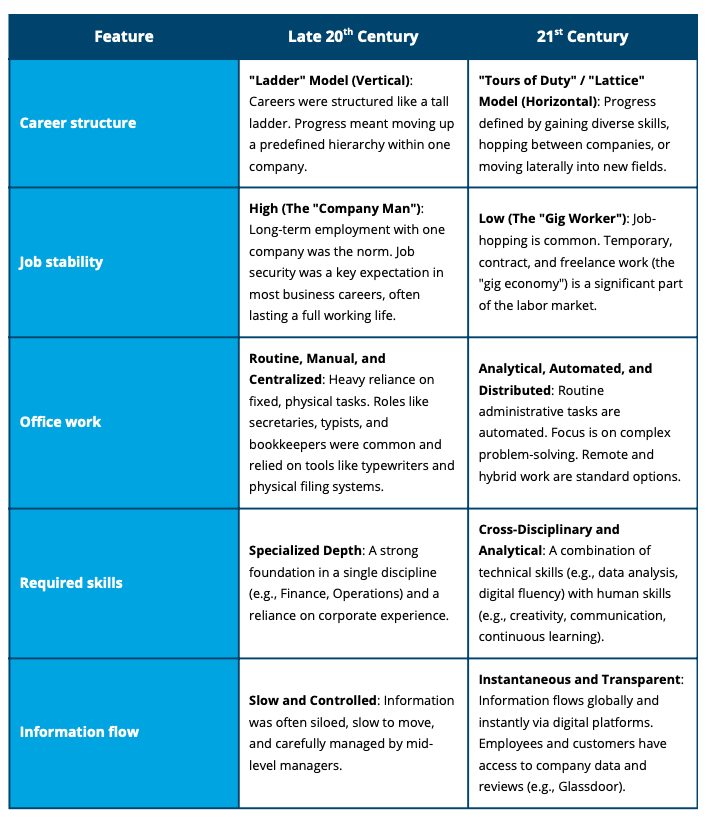
Careers for Business Majors
Posted by
The decision about what to study in college is often a monumental one, fraught with excitement, uncertainty, and nerves. For many high school students considering their major, a degree in business stands out as a smart, versatile, and rewarding choice. Why? Because virtually every organization on the planet — from tech startups and global corporations to nonprofits and government agencies — relies on people with business expertise. Studying business doesn’t pigeonhole you into a single job; it opens a vast landscape of careers for business majors, equipping you with skills that are always in demand.
Learn more about the exciting possibilities that await with a degree in business, including a list of 20 top careers for business majors, and get some practical advice on how to secure the best jobs in business.
Exploring careers for business majors
Before we talk about what degree in business you should work toward, or which business school to attend, let’s travel back into the past. Careers for business majors looked far different in the latter part of the 20th century than they do today.
The shift in corporate and business jobs has been driven by technological advancements, globalization, and shifting cultural values.

The flexibility and versatility of business careers
A business education teaches you the fundamentals about how organizations create, manage, and deliver value. This foundational knowledge makes careers for business majors incredibly flexible. Creative thinkers, numbers whizzes, persuasive communicators, and strategic planners all have a place in the business world.
The sheer breadth of careers for business majors is one of the biggest appeals. Instead of learning a single, narrow trade, a degree in business teaches you how different parts of a company, like finance, marketing, and operations, work together. This holistic view enhances graduates’ value and keeps demand for qualified candidates to fill jobs in business consistently high.
Choosing a major within the business discipline, such as finance, marketing, or management, helps you specialize. But the core skills of problem-solving, analytical thinking, communication, teamwork, and leadership — core skills for all business careers — remain transferable. It’s also not uncommon for students who start on one path, such as accounting, to then transition into a related area, like consulting, which shows the adaptability of careers for business majors.
Earning a business degree
The journey toward an exciting business career typically begins with a Bachelor of Science (B.S.) or Bachelor of Arts (B.A.) in Business Administration or a related field. Attending a quality college or business school within a university provides a structured education that prepares you for the corporate world.
Core business classes
Most business degree programs share a foundational curriculum during the first two years. These core business courses ensure every graduate has a solid grasp of the fundamentals required for most business careers and typically include:
- Financial accounting: Learning the principles of how to record, summarize, and report business transactions.
- Micro- and macroeconomics: Understanding how individual markets, consumer behavior, and the overall national and global economy work.
- Business law and ethics: Grasping the legal and moral frameworks within which companies must operate.
- Statistics and quantitative methods: Developing the analytical skills needed to interpret data and make informed decisions using mathematical tools.
- Introduction to management: Exploring organizational structure, leadership theories, and the role of human resources within a company.
After establishing your business foundation and understanding, you can choose a major aligned with your interests and desired career path.
While classroom learning is vital, real-world experience is a game-changer for pursuing careers for business majors. Completing a business internship provides on-the-job training, networking opportunities, and a chance to test-drive potential roles. A successful internship strengthens your resume and can even lead to a job offer after graduation, giving you a major advantage in securing the best jobs for business majors.
Common areas of business
We can categorize the scope of careers for business majors into several key functions that drive successful organizations.
- Finance and accounting: As the backbone of a company’s financial health, people in these business careers manage money, track performance, and ensure compliance. Accountants keep and interpret financial records, prepare taxes, and conduct audits. Financial analysts evaluate investment opportunities and develop financial plans for organizations or clients.
- Marketing and sales: These functions generate revenue by understanding and addressing customer needs or pain points. Marketing managers plan and execute ad campaigns, manage branding, and oversee market research. Sales managers lead teams to sell products or services, manage client relationships, and drive sales energy.
- Management and operations: These roles ensure the business runs smoothly and efficiently by focusing on strategy, people, and processes. Operations managers optimize the production or delivery of goods and services. Human resources (HR) managers recruit, train, and manage an organization’s employees. Management consultants advise companies on strategy, structure, and efficiency.
- Information technology (IT) and data analytics: In the digital age, technology underpins nearly all careers for business majors. Business analysts bridge the gap between IT and the business, defining requirements for new systems. Data analysts use statistical tools to interpret large datasets and provide actionable insights for decision-making.
Although distinct, these interconnected fields demonstrate the value of a degree in business: it prepares you to thrive in these and many other critical roles. The sheer volume and variety of jobs in business mean there’s a pathway for every personality, preference, and aptitude.
Emerging trends and growth opportunities
Disruptive technology and changing global priorities are modifying older roles and creating completely new, highly specialized, and in-demand careers for business majors.
Digital transformation
Digital transformation is the comprehensive integration of digital technology into all areas of a business. This process has fundamentally changed how many companies operate and deliver value, and it’s the most transformative trend influencing the modern business landscape.
- New revenue streams: The move to digital platforms has fueled demand for professionals who can manage e-commerce and digital marketing. E-commerce revenue will continue its rapid growth (about 8% each year), requiring specialists to manage online storefronts, logistics, and user experience (UX).
- The technology backbone: Careers for business majors in this space are booming, particularly those specializing in information systems. These professionals bridge a gap between technical teams and business strategy, managing the critical infrastructure for an entire enterprise. Key roles include cloud architects/engineers, who design and manage a company’s migration and operations on cloud platforms like AWS, Azure, or Google Cloud. Another critical role? Cybersecurity specialists. With a greater reliance on digital assets and remote work, protecting data from breaches is a top-priority growth area for all businesses and a driver of new careers for business majors.
- Operational agility: Automation, including business process automation (BPA) and robotics, is freeing employees from mundane, repetitive tasks. It doesn’t necessarily eliminate jobs, but it does shift the focus to higher-value activities (strategy, innovation, product development) requiring a more agile and skilled workforce.
Sustainability and social impact
Companies are increasingly focused on their environmental, social, and governance (ESG) responsibilities, driven by consumer demand, investor pressure, and regulatory compliance. This focus has created an entirely new sector of careers for business majors.
“Green” initiatives have progressed to the next level, embedding sustainability into core business operations. Some students now pair a degree in business with coursework in sustainability to prepare for roles like:
- Chief sustainability officer (CSO): An executive role responsible for setting and implementing a company’s overall environmental and social strategy.
- ESG reporting analyst/manager: Professionals who collect, analyze, and report on non-financial data to meet regulatory requirements and investor demands for transparency.
- Energy manager: Specialists who focus on performing audits and implementing projects to ensure companies use energy and water efficiently across business operations, particularly in manufacturing and logistics.
Data science and AI
The sheer explosion of data (over 402 million terabytes created every day and over 180 zettabytes in 2025 alone) means that analytical skills are more critical than ever. Data science and artificial intelligence (AI) are revolutionizing decision-making across every business function, from finance to marketing and supply chain management.
Many careers for business majors require proficiency in data analysis, moving decision-making from intuition to evidence-based insights. This strategy has led to big gains in profit margins for many companies, which like to hire business majors who can combine their domain expertise (e.g., marketing or finance) with analytical tools (SQL, Python, R, Tableau). Some of the best jobs for business majors interested in these emerging tech fields include:
- Data scientist/analyst: These professionals collect, process, and structure large datasets to conduct predictive analyses, identify trends, and offer actionable insights that inform strategy.
- AI/Machine Learning (ML) engineer: This role is more technical, but business majors are needed to manage the application of these technologies, ensuring the AI strategy aligns with the company’s financial and operational goals.
Generative AI (GenAI) tools are also creating new opportunities by automating content creation and accelerating design processes, requiring business leaders to manage these tools for productivity, accuracy, and marketing impact.
Top 20 careers for business majors
While a degree in business offers hundreds of options, here’s a list of the most popular, rewarding careers for business majors, including some of the best jobs in terms of growth and compensation.
- Accountant/Auditor: Manages and verifies financial records and reports.
- Business Analyst: Identifies business needs and determines solutions, often involving technology.
- Business Operations Manager: Oversees day-to-day production, service delivery, or operations.
- Compliance Officer: Ensures an organization complies with all applicable laws, regulations, internal policies, and ethical standards to prevent legal and financial risks.
- Data Analyst: Interprets complex data to drive business decisions.
- Digital Marketing Specialist: Focuses on SEO, social media, and online advertising.
- Financial Advisor: Provides financial planning advice to individuals and families.
- Financial Analyst: Evaluates investments and financial decisions.
- Financial Manager: Responsible for an organization’s financial health, focuses on long-term financial planning, investment strategies, and managing risk to achieve business goals.
- Human Resources (HR) Manager: Manages employee relations, benefits, and recruiting.
- Investment Banker: Helps companies raise capital and handles mergers and acquisitions (may require an MBA or specialized business school training).
- IT Manager: Oversees a company’s technology infrastructure.
- Management Analyst/Consultant: Advises organizations on how to improve performance and efficiency.
- Marketing Coordinator: Helps boost brand awareness by supporting marketing campaigns through managing logistics, content, and communication.
- Marketing Manager: Develops and executes marketing strategies.
- Market Research Analyst: Studies market conditions to determine potential sales of a product or service.
- Product Manager: Defines the product vision, identifies the market needs and customer problems, and coordinates the entire lifecycle, from development and launch to growth.
- Project Manager: Leads specific projects, ensuring on-time, on-budget delivery.
- Risk Manager: Finds and addresses potential business threats.
- Supply Chain Manager: Manages product lifecycles, from acquisition and storage of raw materials to the distribution and delivery of final goods to the customer.

Which careers for business majors make the most money?
College isn’t getting any less expensive. In fact, tuition increases an average of 5% each year. So it makes sense to consider the return on investment (ROI) when choosing a major. But while salary isn’t the only reason to choose a career, it is one factor. Generally, the highest-paying careers for business majors require a combination of advanced education (like an MBA), specialized skills, and experience. The highest-paying careers for business majors are often found in:
- Investment banking: Top-tier investment bankers involved in multibillion-dollar deals can earn seven figures (although this salary typically requires an MBA from a renowned business school).
- Management consulting: Senior partners at elite consulting firms like McKinsey, Bain, and BCG earn substantial salaries for advising Fortune 500 companies.
- Executive leadership (CEO, CFO, COO): The C-suite level represents the pinnacle of business careers. Top leaders of major corporations command the highest salaries and compensation packages.
- Specialized finance roles: Careers like quantitative analysts or specialized hedge fund roles often pay very well because they require exceptionally high levels of mathematical and financial expertise.
For new grads, the best jobs for business majors in terms of starting salary are typically entry-level roles in financial analysis, consulting, and data analytics. But the factors contributing to the highest salaries include career progression, geography, the specific sector, and much more — not just the starting role. What leads to the greatest success in careers for business majors? Continuous learning, excellent performance, and strategic networking.
How to get the best business jobs
Securing the best jobs for business majors is a competitive process that requires more than just good grades from your business school. Here are a few tips.
- Choose the right degree and school
While a degree in business is your foundation, the reputation of your business school and program quality (especially in your chosen specialization) can help open doors. Research schools with strong career placement rates in the specific business careers you’re targeting. - Prioritize real-world experience
This non-negotiable step means aiming for at least two business internship experiences during college. You may even get a head start by interning while still in high school! An internship allows you to apply the knowledge from your business courses, build a professional network, and showcase your work readiness. Many jobs in business are filled with applicants who’ve completed business internship programs. - Develop hard and soft skills
Become proficient in technical tools relevant to your field, like spreadsheets, data visualization software (Tableau, Power BI), and financial modeling. Also, focus on improving your written and verbal communication, teamwork, and leadership skills. - Cultivate a professional network
Networking is critical for success in business careers. Attend career fairs, join relevant student organizations, and conduct informational interviews with people working in the jobs in business that interest you. Your network can become a valuable source of information and job leads as you prepare to enter the workforce. - Consider advanced education
While a bachelor’s degree is enough for most entry-level jobs in business, an MBA (Master of Business Administration) or specialized master’s degree (like a Master of Finance or Master of Accounting) can significantly accelerate your career, leading to higher-level, higher-paying jobs.
Note: Many companies will cover tuition partially or completely for less-experienced employees who want a graduate degree. When you’re job-hunting, check to see whether the companies you’re applying to offer that benefit.
Careers for business majors - takeaways
The business world has nearly limitless opportunities, and a business degree is your passport to nearly any industry you can imagine.
- Business is flexible, not limiting. A business degree is one of the most versatile degrees you can get because nearly all companies need people who understand money, customers, and operations.
- Core skills are your superpowers. All business degrees start with a foundational toolkit that increases your adaptability: accounting, economics, statistics, and management. Your choice of major allows you to specialize further, but the most valuable skills are transferable soft skills (communication, problem-solving, teamwork).
- The hottest careers are digital and green. Digital transformation is driving growth in e-commerce, cybersecurity, and information systems — areas of operations you’ll find in tens of thousands of companies. About 90% of companies are engaged in some type of digital initiative! Sustainability and social impact (ESG) aren’t niche roles anymore, either, but integral and increasingly in-demand careers for business majors.
The world needs ethical and talented individuals to lead its organizations. The future of careers for business majors is bright. By strategically pursuing a degree in business, seeking meaningful business internship opportunities, and continually developing your skills, you’ll position yourself to embark on a fulfilling career journey after graduation.
Blog Categories
- Career Advice
- College Admissions
- Colleges & Universities
- Financial Aid and Scholarships
- For Counselors
- For Parents
- For Students
- Gap Years
- Mental Health and Wellness
- Online Learning
- Performing and Visual Arts
- STEM Majors and More
- Summer Programs
- Teen Volunteering
- Trade & Vocational Schools
- Tutoring & Test Prep

Organization with listings on TeenLife? Login here
Register for Free
We’re here to help you find your best-fit teen-centered academic and enrichment opportunities.
Forgot Password
"*" indicates required fields










